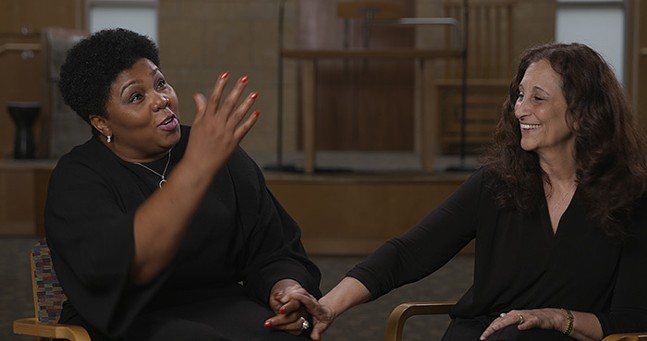JFilm returns with 18 films and a mission
[
{
"name": "Local Action Unit",
"component": "24929589",
"insertPoint": "3",
"requiredCountToDisplay": "1"
}
]
After being canceled last spring due to concerns surrounding the COVID-19 outbreak, the JFilm Festival returns to immerse audiences in the Jewish experience with virtual screenings, panel discussions, and more. This year, the festival also has a clear mission of highlighting how communities can acknowledge and work together against social injustice and corruption.
Kathryn Spitz Cohan, executive director of Film Pittsburgh, the nonprofit that organizes JFilm and other major film events in the city, believes addressing these issues is central to their mission.
"I would say we're really trying, through the films that we curate, to move people from point A to point B, meaning bringing people together to understand that we're more alike than different regardless of our skin color, our religion, our political beliefs," says Spitz Cohan. "We're really trying to help people to realize that that is indeed the case. And that, you know, racism, anti-Semitism, these ills that the world is challenged by, that they're not for anybody's good. Nobody benefits."
That sentiment comes across in the theme of the 28th JFilm Festival, which invites audiences to "See How We're Different, Discover How We're the Same."
One film exemplifying this is Shared Legacies, a documentary highlighting the history of Jewish and Black communities banding together to battle racism and anti-Semitism in the United States. Directed by Dr. Shari Rogers, the film looks at how Black and Jewish leaders found common cause during the turbulent Civil Rights movement, with figures like Rabbi Abraham Joshua Heschel walking alongside Dr. Martin Luther King Jr. during the 1965 Selma marches.
Similarly, the documentary A Crime on the Bayou looks at the bond formed between a young Jewish attorney and the Black man he defends against a wrongful, racially motivated conviction in 1960s New Orleans.
Besides these two films, the festival — taking place virtually from Thu., April 22 though Sun., May 2 — will also screen a documentary about funnyman and game show host Howie Mandel, and Sublet, a narrative feature about a gay, middle-aged travel writer and a young filmmaker who share a pad in Tel Aviv. In total, audiences can expect 18 stories from around the globe encompassing an array of cultures and experiences, ranging from Leona, a Mexican film about a Syrian Jewish woman finding love, to Misha and the Wolves, a baffling documentary about a Holocaust orphan who claims to have been raised by wild animals.
Spitz Cohan says that one of the reasons they chose films like Shared Legacies and A Crime on the Bayou is to revisit significant moments or movements that have become lost to time. She believes doing so demonstrates how alliances are key to fighting against hate in a time when that is needed more than ever. To punctuate this, Spitz Cohan points out how Shared Legacies includes footage of the local Tree of Life synagogue that, in 2018, became the site of the worst anti-Semitic attack in U.S. history.
"So it's just a way to teach people history, and also, take a look at what we can do today," she says.
That awareness extends to the dysfunction within our government, especially when looking back at the recently ended, unprecedented term of former President Donald Trump. This comes through in the festival selection Kings of Capitol Hill, a documentary examining how the American Israel Public Affairs Committee, considered one of the most influential lobby organizations in the U.S., went from an idealistic, liberal group to embracing Trump. The development is an odd one given how Trump is credited with empowering a new wave of anti-Semitism and white supremacy.
"I think that when a film makes a statement, and gives you food for thought, I think it's really valuable to look at," says Spitz Cohan. "And I think people are interested right now in how things work much more so than they were five years ago. They're much more interested in, how does the government really work? And how does it affect me? And who does it benefit? And we're much more aware of it now. And so, for that reason, it makes the forum really attractive, because it exposes something that we don't really get to learn about otherwise."
Besides screenings, Spitz Cohan says the festival offers other opportunities for audiences to engage with the films, including post-screening parties over Zoom, pre-recorded Q&As with filmmakers, and “Film Schmooze” — live, casual discussions presented in partnership with the University of Pittsburgh Jewish Studies Program.
Spitz Cohan adds that, while the pandemic has taught Film Pittsburgh a lot and opened the organization up to a wider audience, she looks forward to returning to in-person events.
"We are hopeful,” she says, “that this will be our last all-virtual festival.”
JFilm Festival. Thu., April 22-Sun., May 2. $15 general admission/$75 six packs/$136 all festival passes. filmpittsburgh.org
Kathryn Spitz Cohan, executive director of Film Pittsburgh, the nonprofit that organizes JFilm and other major film events in the city, believes addressing these issues is central to their mission.
"I would say we're really trying, through the films that we curate, to move people from point A to point B, meaning bringing people together to understand that we're more alike than different regardless of our skin color, our religion, our political beliefs," says Spitz Cohan. "We're really trying to help people to realize that that is indeed the case. And that, you know, racism, anti-Semitism, these ills that the world is challenged by, that they're not for anybody's good. Nobody benefits."
That sentiment comes across in the theme of the 28th JFilm Festival, which invites audiences to "See How We're Different, Discover How We're the Same."
One film exemplifying this is Shared Legacies, a documentary highlighting the history of Jewish and Black communities banding together to battle racism and anti-Semitism in the United States. Directed by Dr. Shari Rogers, the film looks at how Black and Jewish leaders found common cause during the turbulent Civil Rights movement, with figures like Rabbi Abraham Joshua Heschel walking alongside Dr. Martin Luther King Jr. during the 1965 Selma marches.
Similarly, the documentary A Crime on the Bayou looks at the bond formed between a young Jewish attorney and the Black man he defends against a wrongful, racially motivated conviction in 1960s New Orleans.
Besides these two films, the festival — taking place virtually from Thu., April 22 though Sun., May 2 — will also screen a documentary about funnyman and game show host Howie Mandel, and Sublet, a narrative feature about a gay, middle-aged travel writer and a young filmmaker who share a pad in Tel Aviv. In total, audiences can expect 18 stories from around the globe encompassing an array of cultures and experiences, ranging from Leona, a Mexican film about a Syrian Jewish woman finding love, to Misha and the Wolves, a baffling documentary about a Holocaust orphan who claims to have been raised by wild animals.
Spitz Cohan says that one of the reasons they chose films like Shared Legacies and A Crime on the Bayou is to revisit significant moments or movements that have become lost to time. She believes doing so demonstrates how alliances are key to fighting against hate in a time when that is needed more than ever. To punctuate this, Spitz Cohan points out how Shared Legacies includes footage of the local Tree of Life synagogue that, in 2018, became the site of the worst anti-Semitic attack in U.S. history.
"So it's just a way to teach people history, and also, take a look at what we can do today," she says.
That awareness extends to the dysfunction within our government, especially when looking back at the recently ended, unprecedented term of former President Donald Trump. This comes through in the festival selection Kings of Capitol Hill, a documentary examining how the American Israel Public Affairs Committee, considered one of the most influential lobby organizations in the U.S., went from an idealistic, liberal group to embracing Trump. The development is an odd one given how Trump is credited with empowering a new wave of anti-Semitism and white supremacy.
"I think that when a film makes a statement, and gives you food for thought, I think it's really valuable to look at," says Spitz Cohan. "And I think people are interested right now in how things work much more so than they were five years ago. They're much more interested in, how does the government really work? And how does it affect me? And who does it benefit? And we're much more aware of it now. And so, for that reason, it makes the forum really attractive, because it exposes something that we don't really get to learn about otherwise."
Besides screenings, Spitz Cohan says the festival offers other opportunities for audiences to engage with the films, including post-screening parties over Zoom, pre-recorded Q&As with filmmakers, and “Film Schmooze” — live, casual discussions presented in partnership with the University of Pittsburgh Jewish Studies Program.
Spitz Cohan adds that, while the pandemic has taught Film Pittsburgh a lot and opened the organization up to a wider audience, she looks forward to returning to in-person events.
"We are hopeful,” she says, “that this will be our last all-virtual festival.”
JFilm Festival. Thu., April 22-Sun., May 2. $15 general admission/$75 six packs/$136 all festival passes. filmpittsburgh.org














